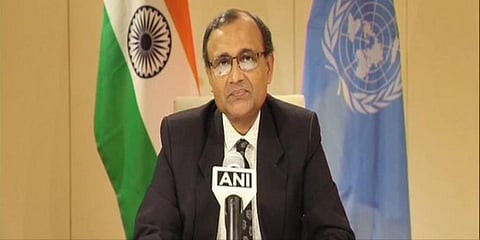

UNITED NATIONS: India at the UN Security Council has said that it is willing to coordinate with "other stakeholders" to work towards enabling expeditious provision of much-needed assistance to the people of Afghanistan and called on countries in the region to come together, "rising above partisan interests."
India's Permanent Representative to the UN, Ambassador TS Tirumurti, addressing the UNSC open briefing on the United Nations Assistance Mission in Afghanistan (UNAMA) on Wednesday, said that India has supported the call of the international community that access to humanitarian assistance for Afghanistan should be direct and without any hindrance.
"India is once again ready to deliver urgent humanitarian aid consisting of food grains and medicines to the people of Afghanistan. India remains steadfast in its commitment towards humanitarian assistance to the people of Afghanistan," he said.
"We call on the international community and countries in the region to come together, rising above partisan interests.
"As the largest regional development partner of Afghanistan, India is willing to coordinate with other stakeholders to work towards enabling expeditious provision of much needed assistance to the people of Afghanistan," Tirumurti said.
He stressed that humanitarian assistance should be based on the principles of neutrality, impartiality and independence, and disbursement of the aid should be "non-discriminatory and accessible to all, irrespective of ethnicity, religion or political belief" with the assistance reaching the most vulnerable first including women, children and minorities.
Tirumurti noted with concern that Afghanistan has already seen much bloodshed and violence in recent years and the current humanitarian situation remains dire.
According to the Food and Agriculture Organisation (FAO), over half of Afghanistan's population is facing crisis or emergency levels of acute food insecurity, and urgent humanitarian assistance is required to meet the basic food needs of the people.
Last week, India hosted the Delhi Regional Security Dialogue on Afghanistan that was attended by security czars of Russia, Iran, Kazakhstan, Kyrgyzstan, Tajikistan, Turkmenistan and Uzbekistan.
At the regional dialogue, National Security Advisors (NSAs) of the countries called for providing humanitarian aid to Afghanistan in an unimpeded, direct and assured manner.
Pakistan has not allowed transit facilities to send aid to Afghanistan.
However, Prime Minister Imran Khan said last week that he would consider a plea from Afghanistan for the transportation of wheat offered by India through Pakistan on "exceptional basis for humanitarian purposes and as per modalities to be worked out."
Tirumurti told the Council meeting that India continues to grant educational scholarships to thousands of Afghan men and women to continue their education in India.
India has undertaken more than 500 development projects covering all 34 provinces of Afghanistan, the ambassador said.
"We have also extended humanitarian assistance through the delivery of 75,000 metric tonnes of wheat and essential medical supplies and COVID vaccines last year to Afghanistan," he said.
Over the last two decades, India has contributed significantly to the development of Afghanistan and Indian development projects have been undertaken in every critical area of socio-economic development including power, water supply, road connectivity, healthcare, education, agriculture and capacity building, he said.
Tirumurti noted that the "Delhi Declaration on Afghanistan" adopted at the Regional Security Dialogue of National Security Advisors reflects the much-needed regional consensus on Afghanistan.
"The international community and key stakeholders including from Afghanistan have welcomed the Delhi Declaration on Afghanistan," he said.
The declaration said the NSAs pitched for providing assistance to the Afghan people in an unimpeded, direct and assured manner and that aid should be distributed in a "non-discriminatory" manner across all sections of the society.